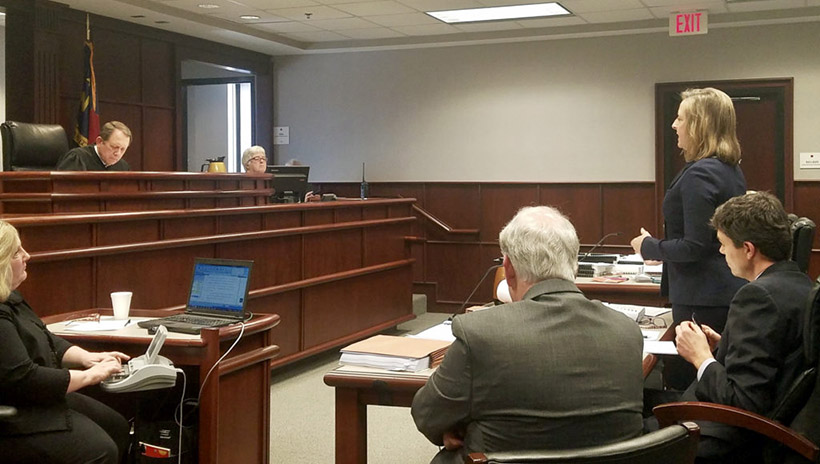Publisher's note: This post appears here courtesy of the Carolina Journal, and written by Lindsay Marchello.
Melanie Dubis, the attorney representing the Leandro plaintiffs, argues before Superior Court Judge David Lee in February 2018. | Photo: Lindsay Marchello
One of the most significant documents in N.C. public education is being kept under lock and key.
The WestEd report is supposed to restart proceedings in the
Leandro court case. After 25 years, the dispute over education opportunities hasn't found a conclusion.
The parties in the long-running
Leandro case agreed to commission an independent third party to develop recommendations for how the state could comply with the
Leandro standards.
WestEd, a California-based education consulting agency, was given the task.
After months of reviewing the N.C. public education system, WestEd on June 17 turned in its report to presiding Superior Court Judge David Lee, who issued a court order making the report confidential.
"The Court believes that premature dissemination of the working document, or its attendant materials, may jeopardize some or all of the efforts that have been expended by WestEd, and the litigants, over the last number of months," the
court order sealing the WestEd report reads.
The document that could have far-reaching ramifications for North Carolina, yet only a select few have seen it.
Carolina Journal asked numerous interested parties if they may have seen the report, but most offered little, if anything.
The WestEd report will contain policy recommendations for how the state can comply with the
Leandro rulings, but anything requiring the appropriation of money will need the General Assembly's approval, according to the N.C. Constitution. Mandating additional money for schools from the state is problematic constitutionally, in addition to how it would affect taxpayers and, potentially, future funding for N.C. charter schools.
Rep. Craig Horn, R-Union, said he hasn't seen the report. He chairs the House education appropriations committee.
"It is bothersome that the report, or at least the executive summary, has not yet been released," Horn said.
"I am certainly anxious to read and digest its conclusions and recommendations."
But Horn said he understands why Lee didn't release the report as soon as he received it.
"Early release of the report would have resulted in unnecessary conjecture regarding conclusions that the court should reach versus what conclusions the court will reach," Horn said.
In any case, Horn said he's concerned the report and the ruling will become political fodder. He's worried people will lose focus on how North Carolina should ensure the needs of students and families are being met.
"As in all things, the actions that caused the development of this report did not occur overnight, nor will the actions necessary to rectify the consequences occur overnight," Horn said.
"Again, I say that the focus must be on how we can and should adjust in order to respond to the needs of all students in North Carolina."
Eric Snider, general counsel for the State Board of Education, said he couldn't say much about the report, as Lee's order prevents the parties from sharing details.
Snider did say, however, that members of the education board have access to the document.
"I can't tell you anything about it or give you any reactions to it," Snider told
CJ.
As a member of the State Board of Education, State Treasurer Dale Folwell also has access to the report. He couldn't say anything more about it.
Jamey Falkenbury, communications director for Lt. Gov. Dan Forest, another state board member, said Forest is aware of the contents of the report but wouldn't comment further because of the continuing litigation.
Graham Wilson, director of communications at the Department of Public Instruction, declined to comment when asked whether State Superintendent Mark Johnson has seen the WestEd report. The state superintendent is in charge of the public education system, overseeing millions of students and thousands of schools.
The
Leandro case began in 1994, when five rural school districts sued the state, arguing they couldn't raise enough tax revenue to provide a quality education for their students. Wealthier neighbors, they argued, could.
In 1997, the N.C. Supreme Court held that every child has a right to
"a sound, basic education" under the state constitution. The court again ruled in 2004 the state failed to live up to the
Leandro standards set by the previous ruling.
Now the WestEd report may be the beginning of the end for the long-running case.
Bob Orr, a former N.C. Supreme Court Justice, said it's not unusual that the WestEd report is confidential. Orr wrote the 2004 court opinion in
Leandro II.
"The court probably feels like [the report] needs to be reviewed internally before its made public," Orr said.
"It's simply a recommendation. It's not something that the court is simply going to rubber stamp."
Orr said Lee has to figure out how to wrap up 25 years of litigation in a way that satisfies both parties.
"I don't think the judge, who I don't know personally, would surreptitiously do something. He is taking a very measured approach and trying to get as much information," Orr said.
No explicit deadline has been provided for making the report public.
"This case has never had a traditional trajectory," Orr said.
"I think that's why the court is trying to find a conclusion."

